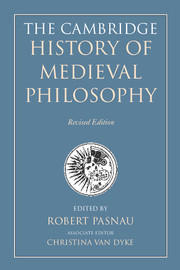Book contents
- Frontmatter
- Contents of Volume 1
- Preface
- List of contributors
- Frontmatter
- Contents of Volume 2
- Introduction
- I Fundamentals
- 1 Origins in baghdad
- 2 The emergence of medieval latin philosophy
- 3 Byzantium
- 4 The rise of the universities
- 5 Monks and friars
- 6 Platonism
- 7 Augustinianism
- 8 Censorship*
- 9 Modernity
- II Logic and language
- III Natural philosophy
- IV Soul and knowledge
- V Will and desire
- VI Ethics
- VII Political philosophy
- VIII Metaphysics
- IX Theology
- Appendices
- Bibliography of primary sources
- Bibliography of secondary sources
- Index nominum
- Index rerum
- References
8 - Censorship*
from I - Fundamentals
Published online by Cambridge University Press: 05 August 2014
- Frontmatter
- Contents of Volume 1
- Preface
- List of contributors
- Frontmatter
- Contents of Volume 2
- Introduction
- I Fundamentals
- 1 Origins in baghdad
- 2 The emergence of medieval latin philosophy
- 3 Byzantium
- 4 The rise of the universities
- 5 Monks and friars
- 6 Platonism
- 7 Augustinianism
- 8 Censorship*
- 9 Modernity
- II Logic and language
- III Natural philosophy
- IV Soul and knowledge
- V Will and desire
- VI Ethics
- VII Political philosophy
- VIII Metaphysics
- IX Theology
- Appendices
- Bibliography of primary sources
- Bibliography of secondary sources
- Index nominum
- Index rerum
- References
Summary
INTRODUCTION
A great many medieval thinkers were involved in the process of censure, either as defendants or as members of an inquiry commission. Often nothing came of the process beyond suspicions or denunciations; other times judicial procedures were initiated; sometimes these led to drastic disciplinary measures.
It is very tempting to judge the Middle Ages in light of these practices of information control and to draw the conclusion that freedom of thought was systematically restricted. Another temptation – more subtle – is to reconstruct the history of ideas from these condemnations. Judicial procedures usually entailed a list being made of very short, allegedly erroneous propositions taken from the work of one or more authors: 13 condemned by the bishop of Paris in 1270, and 219 more in 1277; 22 against Peter of John Olivi in 1283; 51 against William of Ockham in 1326, to mention but a few. It is thus very appealing to any historian to cling to these collections of articles in order to reconstruct, by antithesis, an author’s thought, thereby dispensing with the detailed reading of an all too vast body of work. This is one of the reasons why contemporary historiography has focused on the phenomenon of medieval censorship, uncritically adopting the hermeneutical principle that has been widely accepted since Ernest Renan, according to whom “every condemnation in ecclesiastical history rests on a professed error.” Reality, however, is more complex.
- Type
- Chapter
- Information
- The Cambridge History of Medieval Philosophy , pp. 99 - 113Publisher: Cambridge University PressPrint publication year: 2014
References
- 1
- Cited by



